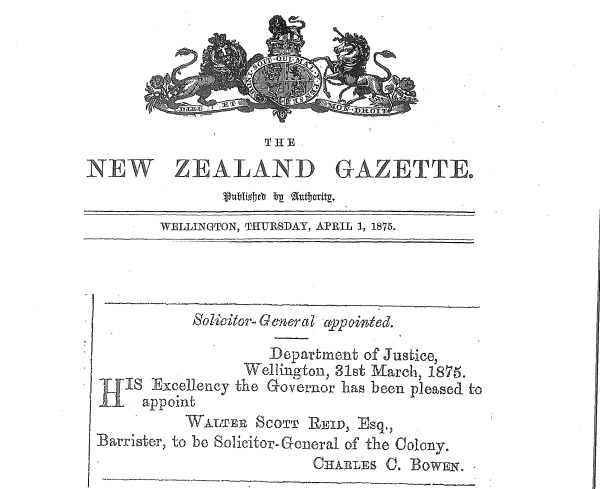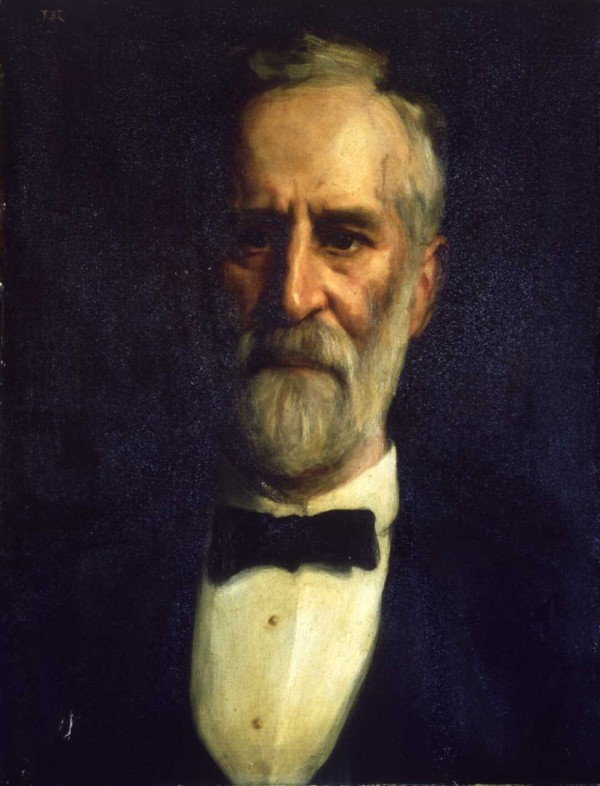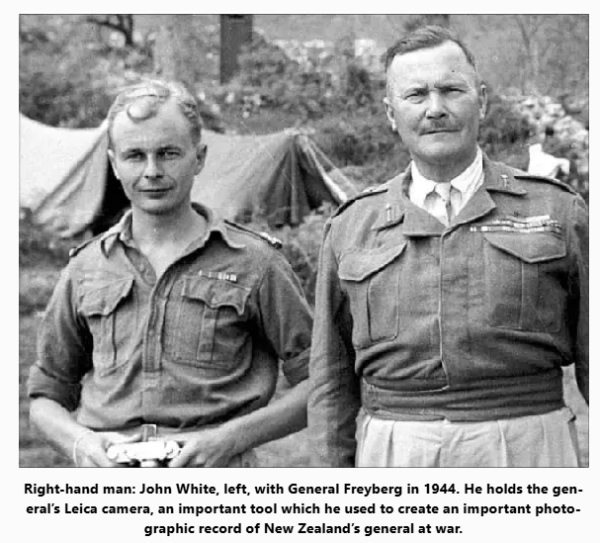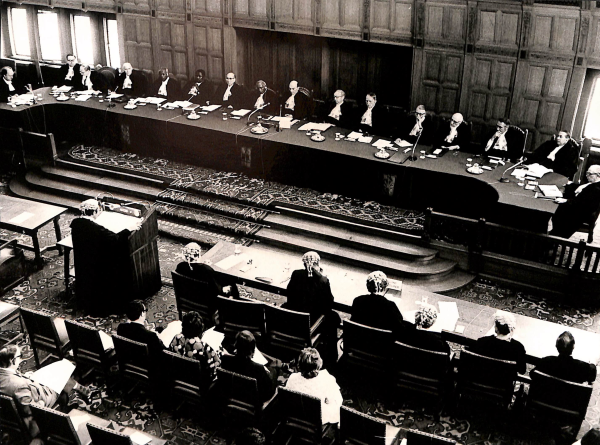Crown Law Timeline
In 2025 Crown Law is marking 150 years of support for the Solicitor-General of New Zealand. We have begun building this timeline and will add to it. Please visit us again soon to learn more about our history.
This timeline contains some key dates for the Crown Law Office, as well as notable New Zealand milestones to which the office contributed.
The early days
 1873 The judicial branch of the Colonial Secretary’s Office is divided into the Department of Justice and the Crown Law Office.
1873 The judicial branch of the Colonial Secretary’s Office is divided into the Department of Justice and the Crown Law Office.
1875 Walter Reid, then Assistant Law Officer within the Crown Law Office is appointed Solicitor General (1875 – 1900)
Solicitor-General v Dunedin City Corporation (1875) 1 NZ Jur (NS) 1 - Supreme Court holds that the Governor was empowered by virtue of his commission to appoint a Solicitor-General, even though there was no statutory authority for the appointment, and judicial notice was taken of the then holder of the office.
1876 The new Government Building (current home to the Victoria University of Wellington Law School and Library) on Lambton Quay was completed in November 1876. Crown Law moved into the building in 1877.
The provinces are abolished, leaving central government as the single legislative authority.
1879 Crown Law's annual funding was £2160, and the Salary of Solicitor General was £1,000 (worth approximately £207,000 in March 2025).
1888 One of – if not the – longest-serving, Crown Law employees, Mr. Ernest Yevily Redward was transferred to the Crown Law Office, where he remained for thirty-seven years. In 1907 he received the title of Assistant Law Officer, the title being changed in 1917 to that of Crown Solicitor.
1893 Universal suffrage is introduced for women aged 21 and over (including Māori women). New Zealand becomes the first self-governing country to grant the right to vote to all adult women.

Walter Reid, New Zealand's longest-serving Solicitor-General (1875-1900)
Crown Law, the Solicitor-General and the 20th Century
1900 Frederick Fitchett appointed Solicitor General (1900 – 1910)
1907 New Zealand becomes a dominion. Prime Minister Sir Joseph Ward reads a proclamation announcing that New Zealand has ceased to be colony and is now a dominion.
1910 John Salmond appointed Solicitor General (1910 – 1920)
1914 – 1918 The First World War threw on the Crown Law Office a sudden burden of settling emergency regulations and many other classes of documents not made public, and of advising in novel cases for which no New Zealand precedent existed.
1920 William Cunnigham MacGregor appointment Solicitor General (1920 – 1923)
1925 Arthur Fair KC appointed Solicitor General (1925 – 1934)
1934 Waitangi Day is formally commemorated for the first time
Henry Havelock Cornish appointed Solicitor General (1934 - 1945)
1939 - 1945 World War Two breaks out
1941 The Commission of Inquiry was established by the Government to investigate the alleged leakage of information regarding shipping movements and the circumstances surrounding the loss of the Holmwood, Rangitane, Yiuni and Komata. Mr Cornish as Solicitor General was in attendance and assisting the Commission with Dr N A Foden.

John White (Solicitor-General 1966-70) also served during World War Two, alongside General Freyberg
1945 Herbert Edgar Evans KC appointed Solicitor General (1945 – 1957)
1947 Crown Law has expanded to employ eight staff, as noted in the 35th Report of the Public Service Commission
1957 Herbert Richard Churton Wild QC appointed Solicitor General (1957 – 1966)
The Crown Law Office was completely re-organised and revitalised. Outside staff were recruited, as well as those from within the Public Service and the range of work the Office did was greatly expanded.
1960 Crown Law opened a branch office in Auckland, which continued to operate until it was closed in December 1987.
1964 Crown Law Office moved to the Law Society Building, Waring Taylor Street in 1964.
1966 John White appointed Solicitor General (1966 – 1970)
1970 Richard Savage QC appointed Solicitor General (1970 – 1980)
1973 On 9 May 1973, Australia and New Zealand each instituted proceedings against France concerning tests of nuclear weapons which France proposed to carry out in the atmosphere in the South Pacific region.

General view of hearing New Zealand v France at the International Court of Justice
Attorney-General Martyn Finlay and Solicitor-General Richard Savage appeared on behalf of the New Zealand government. The ICJ gave a provisional ruling in support of New Zealand and Australia, but no final ruling was given as the French ceased atmospheric tests in 1974.
1974 Waitangi Day (then known as New Zealand Day) becomes a national holiday.
William Sutch Spy Case - Dr WB Sutch was arrested on 26 September 1974 on charges of sharing state information with Russian diplomat Dimitri Aleksandrovick Razgovorov. At trial the Crown was represented by Solicitor-General Richard Savage and Crown Counsel Paul Neazor. Dr Sutch was acquitted of all charges. See R v Sutch [1975] 2 NZLR 1
1976 Former Solicitor-General Wild now Chief Justice Wild heard this significant constitutional case examining whether press statements by Robert Muldoon had breached section 1 of the Bill of Rights 1688 in Fitzgerald v Muldoon and Others [1976] 2 NZLR 615.
1980 Paul Neazor QC appointed Solicitor General (1980 – 1989)
1985 Crown Law moves to Wool House on Brandon Street.
The bombing of the Rainbow Warrior took place on 10 July 1985, in Auckland's Waitemata Harbour. It was the first time an act of international state-sponsored terrorism had been committed in New Zealand waters. Crown Law was involved in giving advice and the subsequent Arbitration.
1986 Homosexual Law Reform Act 1986
1987 The New Zealand Nuclear Free Zone, Disarmament, and Arms Control Act was passed into law, establishing this country as a nuclear and biological weapon-free zone.
1989 John McGrath QC appointed Solicitor General (1989 – 2000)
The Annual Report of 1989 shows Crown Law staff numbers had reached 49 legal and corporate staff.
1990 New Zealand Bill of Rights Act (NZBORA) safeguards New Zealanders’ democratic and civil rights.
Crown Law completes its first vetting for inconsistency with NZBORA in December 1990, with examination of the Bail (Miscellaneous Provisions) Bill.
1992 The first set of Prosecution Guidelines are issued on 1 March 1992.
Crown Law moved to St Pauls Square, 45 Pipitea Street in late 1992.
The Mutual Assistance in Criminal Matters Act comes into force. Following the interception of three letter bombs the Attorney-General made a request to the United States Department of Justice, and the information requested led to identification and charging of an individual.
1993 Prebble v Television New Zealand Ltd [1993] 3 NZLR 513 (CA); [1994] 3 NZLR 1 (PC) – Hon Mr Richard Prebble claimed the TVNZ programme Frontline has defamed him. TVNZ attempted to rely on events in the House of representatives in their defence. The Attorney-General appeared as amicus, arguing on behalf of the House that parliamentary privilege prevents the Courts from receiving evidence of statements made in the House.
1994 A significant year for ongoing litigation.
Amongst the cases, Crown Law was involved in the longest trial in New Zealand’s legal history. Equiticorp Industries Group Limited (In Statutory Management) v. The Crown [1996] 3 NZLR 586 Following a 13 month/ 198-day trial Allan Hawkins, executive chairman of Equiticorp, was sentenced to six years’ imprisonment for stealing $88 million dollars from investors in his company.
1995 The Attorney-General Paul East and Solicitor-General John McGrath travelled to the ICJ for the Nuclear Tests Case – New Zealand v France (1995).
A new millennium
2000 Terence Arnold appointed Solicitor General (2000 – 2006)
2004 Crown Law Office moved to Unisys House, 56 The Terrace in June 2004
The Supreme Court Act 2003 comes into effect, abolishing the right of appeal to the Judicial Committee of the Privy Council in London and establishing a New Zealand-based court of final appeal, the Supreme Court.
2005 Civil Unions Act comes into force.
2006 Dr David Collins QC appointed Solicitor General (2006 – 2012)
2007 Armed police raids were conducted in the Urewera mountain range near the town of Ruatoki on 15 and 16 October 2007, in response to alleged paramilitary training camps. Solicitor-General David Collins turned down police requests to allow the defendants to be charged under the Terrorism Suppression Act 2002.
2011 The Attorney-General commissions a review of the scope and focus of the Solicitor-General’s role, which was carried out by Auckland barrister Miriam Dean QC and Simpson Grierson Special Counsel David Cochrane. The role of the Solicitor-General had previously been looked at in 1986 and 2006.
2012 Michael Heron QC appointed Solicitor General (2012 – 2015)
Crown Law moves to the Justice Centre, 19 Aitken Street.
2016 Una Jagoe QC appointed Solicitor General
On 15 February 2016 Cabinet approved new (and as of March 2025 still current) Cabinet Directions for the Conduct of Crown Legal Business.
2018 The Abuse in Care Royal Commission of Inquiry opens with Crown Law Staff involved.
2019 On 15 March, Brenton Tarrant, a self-proclaimed ‘white nationalist’, opened fire on worshippers at mosques in Deans Ave and Linwood, killing 51 people and wounding another 50. Crown Law is involved in litigation and the subsequent Royal Commission of Inquiry into the Attack.
2021 Solicitor-General Una Jagose QC gave evidence at the Lake Alice Child and Adolescent Unit hearing as part of the Royal Commission of Inquiry into Abuse in Care. Crown Law responds to the Royal Commission’s report He Purapura Ora, he Māra Tipu in relation to the Crown litigation response to the claims filed relating to plaintiffs’ experiences of State care.
2022 Allan Hall - The Supreme Court of New Zealand acknowledged a substantial miscarriage of justice had occurred and overturned his conviction on 8 June 2022. Alan Hall was convicted for the murder of Arthur Easton in 1985. In August 2023, the Government agreed to pay him $5 million in compensation, the largest nominal payout for wrongful conviction in New Zealand history
2024 In May a refresh of the Wellington office in the Justice Centre is completed, and includes a blessing ceremony led by mana whenua representatives.
In September, the library is officially renamed as the Sir John McGrath Law Library, honouring the former Solicitor-General.
On 12 November, the Solicitor-General publicly apologised to survivors of abuse in state care alongside other public service leaders.
